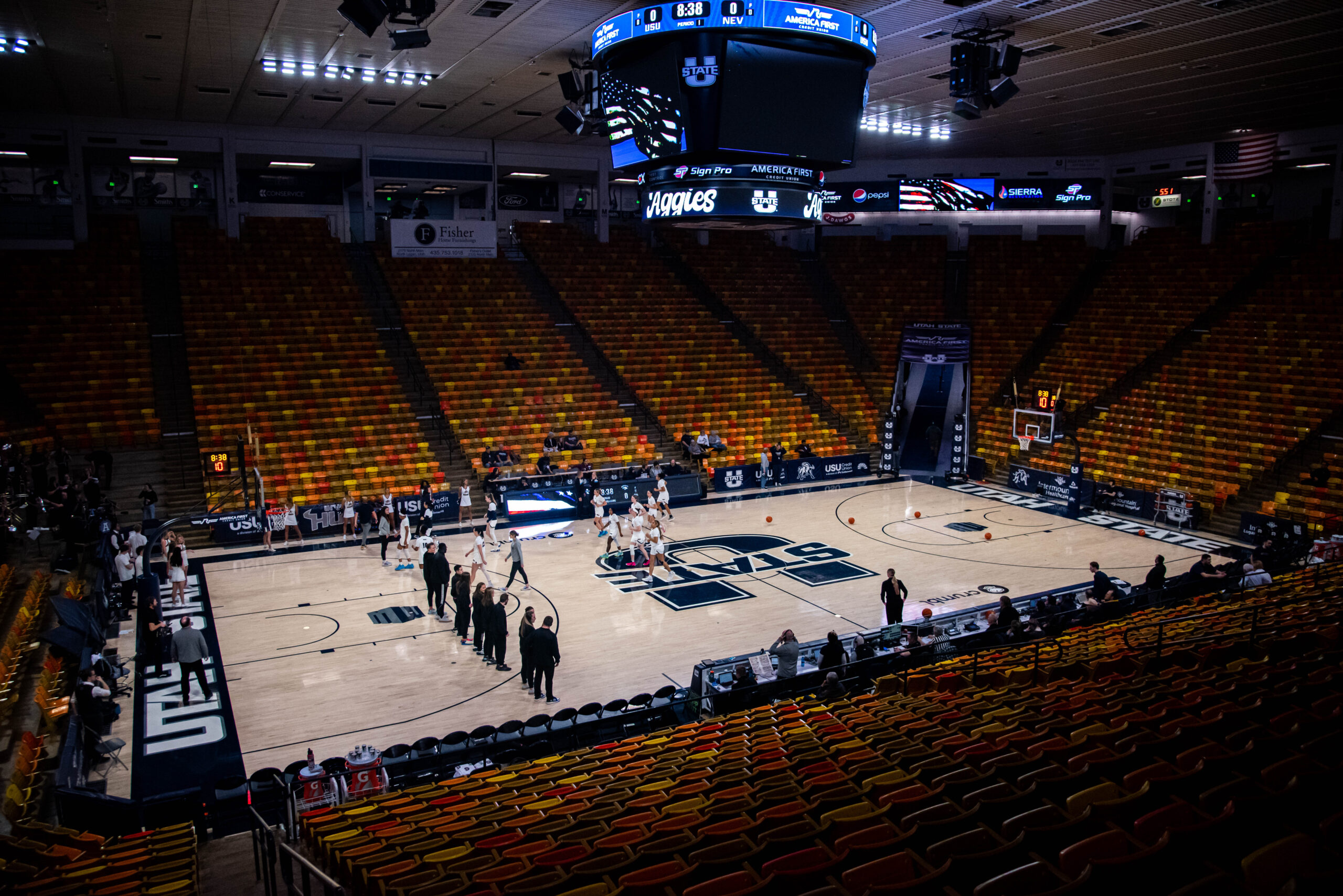USU support staff helps Aggies score high
The 2023-24 Utah State University men’s basketball season has been electric and exciting from the start. The team is currently 16-2 overall and 4-1 in conference play, and Ian Martinez and Great Osobor have both been named Mountain West Conference Players of the Week.
While there is much success on the court, it can be easy to forget about the success that happens off of the court in the classroom.
As many students know, being a full-time student can be enough of a challenge as it is. But throw in daily training and video sessions, plus the pressure of playing in front of a packed Dee Glen Smith Spectrum, and college may sound impossible.
In fact, USU has a 90% graduation rate among student-athletes and had over 100 student-athletes received the Mountain West Scholar-Athlete award in 2022-23.
Justice Smith is the associate director of academic services and works in the department of Student-Athlete Academic Services, SAAS, a group with a large impact on the 16 varsity level sports teams on campus. Their first priority is the education of the student-athletes. They provide them with the academic and any mental help they may need.
Once the required help is identified, SAAS will assist in creating an academic plan for the student to follow so they can keep up in their classes while traveling for their away games.
“When a new athlete comes to USU, we start by identifying what kind of successes and issues there may be,” Smith said.
Along with all these supports, SAAS makes sure all athletes are eligible under NCAA Bylaw 14 that outlines all of the standards that need to be followed. Some standards include making sure each athlete is enrolled as a full-time student and in good standing as a student.
“If a student-athlete needs help with their classes, they can reach out to the learning specialist who can assist by providing one-on-one tutoring or mentoring,” Smith said. “They can help with all aspects of the course.”
If a student-athlete needs special assistance, the learning specialist can also help connect the athlete with the Disability Resource Center where they can help find accommodations for the student on a case-by-case basis. There are 14 tutors on staff that can help in person by request of the student-athlete.
Smith also discussed a program called the A-Game Student-Athlete Development Program. The purpose is to emulate the competitive nature of being an athlete and applying it in their daily lives as a student. If a student-athlete treats their schoolwork as they do their sport, then they will be successful.
“Being a former student-athlete many moons ago and going through the system myself was very helpful,” Smith said. “It’s not just about the sport they are playing right now. This is a program that is used to help these athletes prepare for their next step after graduation.”
But it is not a singular effort from SAAS; it’s a collaborative effort with the university itself.
“We can’t do what we do without our ecosystem of coaches, advisers and faculty,” Smith said. “They are absolutely vital to this process. We are an important piece, but we are complete with everything else working together.”
Being a student doesn’t just mean getting good grades and attending class. College is also a chance for students to meet each other and make lifelong contacts in their chosen fields of study and profession.
Student-athletes also receive support on the social end with the help of public relations professionals like assistant media relations coordinator Ashley Springer.
Springer assists the men’s basketball and the women’s volleyball teams. She manages the athletes’ time so they can focus on their training and schoolwork. That means coordinating with the media on game days, handling interview requests outside of games and practice and taking care of the social media for the team.
“They are super busy, and when there are interview requests, there tends to be a lot of them,” Springer said. “It is important to be as flexible as possible.”
Springer said her day-to-day generally depends on how many interviews are needed, and there is a decent amount of desk work to keep her busy. She said she enjoys the opportunities to get to know the student-athletes better on a personal level.
“This is going to sound cliche. We are the behind-the-scenes people, so, when the players shine and are getting the spotlight in a good way, just knowing and getting to see what they have accomplished — that’s when I am most prideful with my work,” Springer said.
Smith echoed the same sentiment.
“What I love is empowering the athletes and the relationships that I get to have with them. ‘Job’ is not a good word for it, because I don’t feel like I am at work at all,” Smith said.

